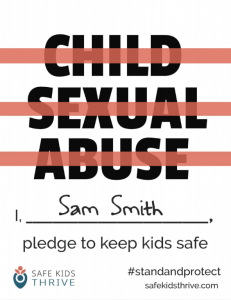Read the Report
Home / Read the Report
Additional Considerations
Up to this point the Task Force report has presented the major building blocks, tools, decisions, strategies and resources that will help YSOs create or strengthen their existing child sexual abuse prevention frameworks. But gathering those things that are needed to do a job – as any mechanic or carpenter knows – is different from using those tools in the ways necessary to make a finished product. How the tools are used can make a big difference between a lasting repair and a temporary, band-aid solution.
The same can be said for attempting to make changes to systems and organizations – especially because they bring the human element into the mix and ultimately try to influence and facilitate changes in the ways people behave. Human nature being what it is, an employer can mandate the adoption of a child safety standard or child sexual abuse prevention framework, and require staff and volunteers to behave in certain ways when around or interacting with children, but that alone does not guarantee they will. Nor does it guarantee that even if they do, the mandated behaviors will continue.
This section of the report introduces the concept of organizational change as a process that evolves over time rather than as a single event that, once accomplished, can be assumed to be working properly to protect children. The process covers how organizations and the people within them react to change, and assumes that not everyone will move toward the desired goals at the same pace. Successful implementation depends both on the strategy or “roadmap” that YSO leadership employs for the desired change, and the organizational culture (e.g., organizational mindset, history, decision- making style, etc.) within which the desired changes are to take place.
The section also emphasizes the critical role of leadership in introducing, managing, and monitoring the progress toward implementing the abuse prevention programs, and the responsibility of staying involved throughout and beyond the initial stages of implementation – maintaining collaborative, ongoing communication with, and feedback to all stakeholders. Well-intentioned and well-structured programs run the risk of weakening over time if leadership assumes that implementation is equal to accomplishment, and turns attention elsewhere to the many other issues and demands that leadership requires. Suggestions and actions are discussed that can help YSO leaders prevent this from happening.
Another key aspect of sustaining a child abuse prevention program is data. No matter how small or large the YSO is, questions about what is working in its child abuse prevention efforts, what is not working, and what needs improvement will (and should) be asked by leadership as well as by a variety of stakeholders. The answers to these questions can only be derived from some form of data collection, and the section makes suggestions about the different types of data that can be collected for analysis and review. Three different types of sample data collection tools are included in the Resources section to assist YSOs in this effort: a “Child Sexual Abuse Prevention Evaluation Tool’; a “Sample Self-Audit Form for YSOs”; and a “Sample Incident Report.”
Annual “self-audits” can provide “snapshots” of the current state of program implementation and help to measure progress and sustain outcomes. These annual snapshots can, in turn, be used to provide ongoing feedback to staff, volunteers, parents and all other interested parties. The Task Force also suggests that the Policies and Procedures themselves should be evaluated every 2-3 years and makes suggestions about how to accomplish this task.
Finally, the section suggests that YSOs need not be isolated in their efforts to build robust child abuse prevention programs, and stresses the importance of community partnerships. These and other collaborative efforts are essential for building relationships, sharing expertise, accessing services and training opportunities, and building legitimacy and advocacy in the communities within which the YSOs operate.
- Acknowledgements
- Executive Summary
- Introduction
- How to Read This Report
- Mission & Purpose of Taskforce
- A Brief History of How the Taskforce Was Organized
- The Charge of the Legislative Language
- Key Sections
- Section 1: Developing Policies and Procedures for Child Protection
- Section 2: Screening and Background Checks for Selecting Employees and Volunteers
- Section 3: Code of Conduct and Monitoring
- Section 4: Ensuring Safe Physical Environments and Safe Technology
- Section 5: Recognizing, Responding to, and Reporting Allegations and Suspicions of Child Sexual Abuse
- Section 6: Training About Child Sexual Abuse Prevention
- Additional Considerations
- Applying the Framework: A Five-Year Plan
- Appendices
- Section-Specific Appendices
- Downloadable Resources

Take the Pledge to Keep Kids Safe
Join us and commit to learning how you can protect the children you serve.
Sign Up to Access Your Learning Center
Customized child sexual abuse prevention guidelines to meet the unique needs of any organization that serves children.
- Evidence-informed guidance
- Actionable prevention steps
- Keeps track of your progress
- Tailored learning tracks


